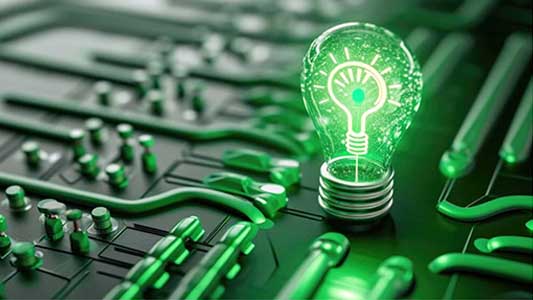The doors will soon open at the APEC 2024 conference in Long Beach, California, taking place from February 25 to 29. Last year, the power design theme was replete with gallium nitride (GaN). This year, the mantra is sustainability, with a more efficient use of power at the heart of most of today’s designs. The conference will explore such questions as:
- How are advances in power conversion technologies actively contributing to sustainability?
- How do wide bandgap (WBG) devices enable more efficient power converters that reduce energy loss and improve system performance?
- What are the environmental benefits of improving power conversion efficiency, and how does this align with global sustainability goals?
- How do we make all power systems more efficient and have less impact on global resources?
Trends in Sustainability
Conference-goers will see plenty of trends focused on electrification—the replacement of technologies based on fossil fuels with electricity-based alternatives. Electric vehicles represent the most common example of this trend, followed by wideband semiconductors that decrease reliance on silicon-based chips with lower cost and greater efficiency, as well as integrating power and data lines via wired networks that eliminates multiple infrastructure cables. Power over Ethernet (PoE), for instance, transmits power and data simultaneously, decreasing communications costs.
There’s hardly a technology discussion today that isn’t expounding on artificial intelligence (AI) and machine learning (ML). At this year’s conference, you’ll find a wealth of information on what it will take for hardware to support AI and its hunger for power. Additionally, miniaturization and its effect on dissipation and the physical properties of semiconductor materials will also be on display.
In the area of WBG semiconductors, materials such as GaN and silicon carbide (SiC) are delivering superior performance, including higher efficiency, faster switching, and the ability to operate at higher temperatures and voltages that enable smaller, more efficient power electronic devices.
The field of power electronics is continuously evolving, driven by technological advances and emerging applications. As power electronics improve, we’ll see the results in a wide range of applications, including energy storage, medical equipment, IoT and continued device miniaturization, renewable energy integration, and improved grid integration. Throughout APEC 2024, transportation and environmental technology that reduces greenhouse gas emissions and promotes sustainable practices will be a key feature.
The APEC 2024 Technical Program—a rich and insightful offering of papers, presentations, and seminars—can be found here.
Global Sustainability Goals
In 2015, all 193 countries of United Nations (UN) adopted the 2030 Agenda for Sustainable Development, creating 17 Sustainable Development Goals (SDGs). Those goals specifically dealing with technology include:
- Clean Water and Sanitation
- Affordable and Clean Energy
- Decent Work and Economic Growth
- Industry, Innovation, and Infrastructure
- Sustainable Cities and Communities
- Responsible Consumption and Production
- Climate Action
- Partnerships for the Goals
The technological solutions actively helping achieve these goals will echo loudly through the conference rooms and hallways of APEC 2024. With much work still to be done, these eight goals represent a continued focus for all technologies, especially power electronics, to unlock sustainable power solutions with new designs and developments. The objectives driving these goals will pop up throughout the seminars, lectures, and conference papers presented this year.
Notable Sessions
Every year, one of the main highlights for APEC attendees are the Plenary Sessions. During these sessions, visionary leaders address matters—both present and future—facing power electronics engineers. Here are three presentations that promise to lead to engaging Q&A sessions:
Balu Balakrishnan, Chairman and CEO of Power Integrations, leads a session on Innovating for Sustainability and Profitability. He’ll discuss fundamental microelectronics innovations and developments in power converter topology and implementation—key to decarbonization and energy sustainability. His talk will also review how innovations allow us to do good for the environment while doing well as a business.
Gregg Lowe, CEO of Wolfspeed, will present The Drive for Silicon Carbide—A Look Back and the Road Ahead. Lowe will review the transformative journey of SiC technology as pivotal in power electronics, most evident today in electric vehicles (EVs). He will also discuss insights into the future of silicon carbide in power electronics and its potential to drive sustainable and efficient power solutions in various applications.
Francesco Carobolante, Director of Corporate Strategy & Ventures at Intel Corporation, is set to present The Future of AI Requires Efficient Power Delivery Inside the Processor, discussing how the development of Integrated Voltage Regulators (IVRs) over the past 20 years was never as important a focus as it is today. AI processors are approaching currents of 1,000A, and heterogeneous integration brings various demanding loads inside the package. His session will highlight how energy efficiency is critical to achieving the vision of sustainable advanced computing that will support the next societal and economic transformation.
Looking Forward
APEC 2024 is sure to be an exciting event that will deliver innovations, insights, and a collaborative environment for all attending. The demand for efficient, reliable, and advanced power electronic solutions continues to grow, and the conference is essential in delivering education, networking opportunities, and a view of the trends and technologies that will play a pivotal role in shaping a sustainable future.












